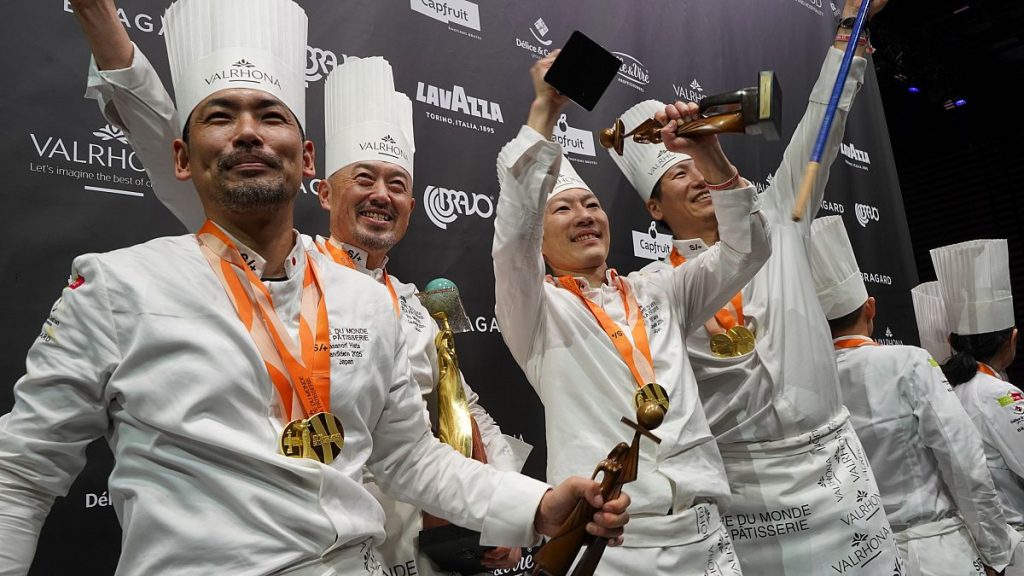The 2025 Pastry World Cup, held in Lyon, France, witnessed a thrilling display of culinary artistry and national pride, culminating in Japan’s triumphant defense of their title. The competition, centered around the intriguing concept of representing one’s country as a gourmet dessert, challenged 18 national teams to translate their heritage into edible masterpieces. Japan’s winning creations showcased a harmonious blend of traditional elements, incorporating Kyomi orange, delicate rice-based wafers, and a recurring dragonfly motif. Italy’s team drew inspiration from Leonardo da Vinci, using Amalfi lemons and hazelnuts to craft pastries that echoed the inventor’s iconic designs, including an edible rendition of his airship. Chile’s team presented a fiery and captivating frozen dessert infused with the exotic flavors of hibiscus, mango, and Limón de Pica, a native citrus fruit. This culinary world cup underscored the delicate balance required to appeal to an international jury while preserving the distinct identity of one’s nation.
The Pastry World Cup is not merely a showcase of aesthetically pleasing desserts; it’s a rigorous test of skill, creativity, and endurance. Each three-person team, comprising a chocolatier, a sugar expert, and an ice master, faces the daunting task of producing five distinct creations within a nine-hour timeframe. These creations encompass a frozen dessert, a restaurant dessert, a breathtaking ice sculpture, and an elaborate buffet display featuring intricate sugar and chocolate centerpieces. This culinary marathon unfolds amidst the vibrant backdrop of the SIRHA Food Service exhibition, where a fervent crowd of supporters creates an electric atmosphere reminiscent of a sporting event. The introduction of the Show Chocolat challenge, which involves teams presenting bite-sized creations from a food truck while dressed in national attire, further amplifies the entertainment factor, reflecting the growing influence of televised cooking competitions.
The increasing popularity of televised cooking shows and social media platforms has presented both opportunities and challenges for the culinary world. While these platforms offer unprecedented exposure, they also create a competitive landscape for attracting talented individuals. Jean-Philippe Darcis, coach of the Belgian team, acknowledged the allure of social media, where young chefs can gain significant visibility without the pressures of formal competitions. He expressed concern that this might discourage some from participating in events like the Pastry World Cup, potentially diminishing the pool of aspiring culinary competitors. However, the competition maintains its prestige and relevance by offering invaluable experience and long-term benefits that extend beyond the immediate gratification of online fame.
Despite the allure of social media, seasoned professionals emphasize the unparalleled educational value of the Pastry World Cup. Christophe Michalak, a former World Cup winner and frequent judge on reality TV cooking shows, draws a clear distinction between the manufactured drama of television and the genuine growth fostered by rigorous competition. He describes television as a “fake life,” where image and entertainment value often overshadow true culinary skill. In contrast, the Pastry World Cup demands meticulous preparation, pushing contestants to refine their techniques and expand their creative boundaries. Michalak’s own experience exemplifies the transformative power of the competition. His rigorous preparation, involving ten simulated competition days, not only honed his skills but also instilled a valuable mindset of continuous improvement.
The enduring appeal of the Pastry World Cup lies in its unique ability to blend artistry, technical mastery, and national pride. The competition serves as a platform for showcasing the rich culinary heritage of diverse cultures, fostering innovation, and inspiring future generations of pastry chefs. The teams’ dedication to representing their countries through meticulously crafted desserts highlights the powerful connection between food and identity. The competition’s demanding format ensures that only the most skilled and resilient chefs emerge victorious, while the enthusiastic support of the audience creates an unforgettable spectacle that celebrates the passion and dedication of these culinary athletes.
In conclusion, the 2025 Pastry World Cup reaffirmed its status as a premier culinary event, showcasing the extraordinary talent and creativity of pastry chefs from around the globe. Japan’s victory, a testament to their consistent excellence, underscores the importance of tradition and innovation in the culinary arts. While the rise of social media presents a new dynamic in the culinary landscape, the Pastry World Cup continues to hold its own as a crucible for developing exceptional skills and fostering a spirit of continuous improvement. The competition remains a powerful testament to the enduring allure of culinary excellence, national pride, and the transformative power of challenging oneself to reach new heights.














